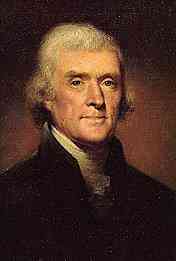
To Alexander von Humboldt Monticello, April 14, 1811MY DEAR BARON,-- The interruption of our intercourse with France for some time past, has prevented my writing to you. A conveyance now occurs, by Mr. Barlow or Mr. Warden, both of them going in a public capacity. It is the first safe opportunity offered of acknowledging your favor of September 23d, and the receipt at different times of the IIId part of your valuable work, 2d, 3d, 4th and 5th livraisons, and the IVth part, 2d, 3d, and 4th livraisons, with the Tableaux de la nature, and an interesting map of New Spain. For these magnificent and much esteemed favors, accept my sincere thanks. They give us a knowledge of that country more accurate than I believe we possess of Europe, the seat of the science of a thousand years. It comes out, too, at a moment when those countries are beginning to be interesting to the whole world. They are now becoming the scenes of political revolution, to take their stations as integral members of the great family of nations. All are now in insurrection. In several, the Independents are already triumphant, and they will undoubtedly be so in all. What kind of government will they establish? How much liberty can they bear without intoxication? Are their chiefs sufficiently enlightened to form a well-guarded government, and their people to watch their chiefs? Have they mind enough to place their domesticated Indians on a footing with the whites? All these questions you can answer better than any other. I imagine they will copy our outlines of confederation and elective government, abolish distinction of ranks, bow the neck to their priests, and persevere in intolerantism. Their greatest difficulty will be in the construction of their executive. I suspect that, regardless of the experiment of France, and of that of the United States in 1784, they will begin with a directory, and when the unavoidable schisms in that kind of executive shall drive them to something else, their great question will come on whether to substitute an executive elective for years, for life, or an hereditary one. But unless instruction can be spread among them more rapidly than experience promises, despotism may come upon them before they are qualified to save the ground they will have gained. Could Napoleon obtain, at the close of the present war, the independence of all the West India islands, and their establishment in a separate confederacy, our quarter of the globe would exhibit an enrapturing prospect into futurity. You will live to see much of this. I shall follow, however, cheerfully my fellow laborers, contented with having borne a part in beginning this beatific reformation. I fear, from some expressions in your letter, that your personal interests have not been duly protected, while you were devoting your time, talents and labor for the information of mankind. I should sincerely regret it for the honor of the governing powers, as well as from affectionate attachment to yourself and the sincerest wishes for your felicity, fortunes and fame. In sending you a copy of my Notes on Virginia, I do but obey the desire you have expressed. They must appear chetif enough to the author of the great work on South America. But from the widow her mite was welcome, and you will add to this indulgence the acceptance of my sincere assurances of constant friendship and respect.
|
